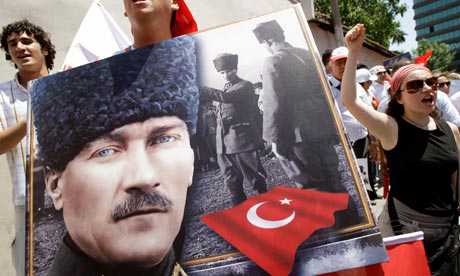The Ottoman empire’s secular history undermines sharia claims
A new paper shows 18th- and 19th-century Ottoman rulers decriminalised homosexuality and promoted women’s education
Tehmina Kazi
guardian.co.uk, Friday 7 October 2011 11.29 BST

Hardline Muslim groups often portray the Ottoman empire as a magic template for a global caliphate. This is then used as a springboard for grandiose arguments that paint a caliphate as viable, and deem it as the only credible model of governance for the future. These arguments are based on a belief that the empire adhered to a single interpretation of sharia (Islamic law) for over 600 years, and – crucially – that its success was contingent on this.
But a paper by Ishtiaq Hussain, published by Faith Matters on Saturday displays a very different picture. Ottoman sultans, or caliphs, in the 18th and 19th centuries launched secular schools and promoted the education of women. The period of reformation known as the Tanzimat saw customary and religious laws being replaced in favour of secular European ones. More surprisingly, homosexuality was decriminalised in 1858 (long before many western states took their cue, and over a century before the American Psychiatric Association declassified it as a mental illness in 1973). Contrary to the claims of hardline groups, religious authorities approved many of these measures.
In terms of broader social change, the Ottomans made strong attempts to integrate non-Muslim communities. On the cultural front, it is well known that a minority of people claim that Islam frowns upon artistic expression. However, the last sultan/caliph, Abdulmecid Efendi (1922-1924) has numerous paintings on display in Istanbul’s new museum of modern art; many others were also keen musicians and played a variety of musical instruments. It is therefore clear that the sultan/caliphs enunciated a progressive vision for a secular Muslim society, many years before al-Qaida and similar groups came into existence.
For those who dismiss President Ataturk’s vision as an anomaly, this reconsideration of their history must come as a nasty shock.
The purpose of Hussain’s paper is to encourage people who carry the baton for totalitarian ideologies – including those who are inspired by Anwar al-Awlaki – to think again. The recent deaths of al-Awlaki and his demagogue Osama bin Laden only mean that part of the battle is won.
The other part of the battle is ideological, and this paper boldly leads the way by challenging a key component of that ideology. It does a stellar job in exposing the fallacies that lie within extremist narratives. For example, why do some groups refer to the Ottoman empire as a “caliphate” when it did not synchronise state law with religious law?
When hardline groups present Islam as a rigid political ideology, they end up doing a great disservice to Islam and Muslim communities. One of Islam’s strengths is its relevance to all places and all times, which means that it can take on numerous expressions according to local circumstances. Scholars like Emory University professor Abdullahi An-Na’im recognise that the content of the sharia is bound to its historical context.
An-Naim maintains that concepts such as human rights and citizenship are more consistent with Islamic principles than a state which purports to be Islamic and enforces sharia. In his book, Islam and the Secular State, he goes as far as to suggest that the very idea of an Islamic state is based on European ideas of state and law, and not the Islamic tradition.
It is now more important than ever for greater numbers of individuals to stand up against fascism and extremism – no matter where it comes from. This is why groups like British Muslims for Secular Democracy (BMSD) – the organisation that I work for – have protested against both al-Muhajiroun (in their various guises) and Stop the Islamification of Europe.
Of course, we support the findings of this paper, and hope this is disseminated as widely as possible. I also hope this paper will get far-right groups to reconsider the history of Muslims in Europe, and make them realise the positive contribution Islam has made in countries like Turkey and Spain.
The importance of grassroots work to this end – in schools, universities, refugee centres and on social networking sites – cannot be underestimated. Finally, I would like to see the government develop a sound understanding of the issues in this paper, and their relevance to the British Muslim situation. This would be a fitting token of support for organisations like BMSD and Faith Matters.
via The Ottoman empire’s secular history undermines sharia claims | Tehmina Kazi | Comment is free | guardian.co.uk.

